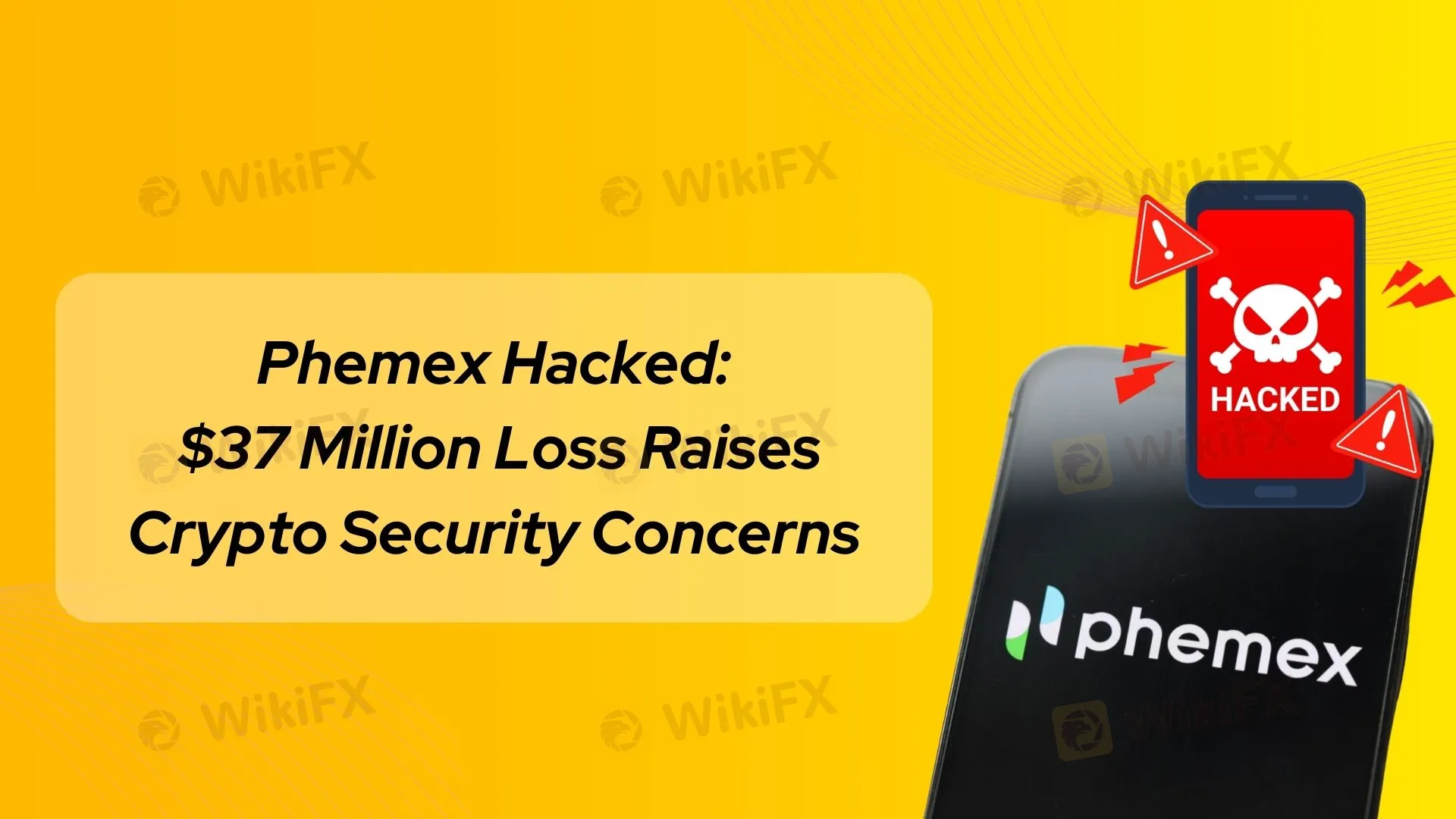简体中文
繁體中文
English
Pусский
日本語
ภาษาไทย
Tiếng Việt
Bahasa Indonesia
Español
हिन्दी
Filippiiniläinen
Français
Deutsch
Português
Türkçe
한국어
العربية
Phemex Hacked: $37 Million Loss Raises Crypto Security Concerns
Abstract:Phemex reports a potential $37M hack targeting hot wallets, prompting withdrawal suspension and security measures to protect user assets.

Singapore-based cryptocurrency exchange Phemex has launched an investigation into a potential security breach involving its hot wallets, with over $37 million worth of digital assets reportedly impacted. Security firm Cyvers first identified the suspicious transactions, which spanned multiple chains, including Bitcoin, Ethereum, and TRON.
Phemex quickly confirmed the incident and announced a temporary suspension of withdrawals to safeguard user assets. According to Cyvers, over 125 suspicious transactions moved funds from Phemexs hot wallets to newly created wallets across several chains such as Ethereum, Binance, Solana, and Avalanche. Some of these assets have already been swapped into other tokens and stablecoins to evade potential freezing.
The exchange reassured users that its cold wallets, which store the majority of customer funds, remain secure and verifiable. Transparency in wallet operations has been emphasized to reinforce trust.
“Our mission to provide a seamless and trusted trading environment remains steadfast. We are actively developing a compensation plan, which will be announced soon,” Phemex stated in an official announcement on X (formerly Twitter).
Phemex‘s Position in the Market
As one of Singapore’s largest cryptocurrency exchanges, Phemex boasts a daily trading volume exceeding $177 million and garners close to a million monthly visits, according to CoinGecko. The exchanges robust market presence makes this incident a critical concern for both users and the broader crypto community.
A Rising Tide of Crypto Security Challenges
The broader cryptocurrency landscape has faced heightened security threats in recent years. In 2024 alone, hacks accounted for $2.15 billion in losses, with scams contributing an additional $834.5 million. These figures represent a 15% increase compared to 2023, underscoring the growing sophistication of attacks on the sector.
Prominent cases, including incidents involving platforms like WazirX, Radiant Capital, and DMM Bitcoin, have highlighted vulnerabilities in multisig wallets and DeFi protocols. Attackers have also leveraged professional platforms like LinkedIn to exploit unsuspecting crypto users.
Disclaimer:
The views in this article only represent the author's personal views, and do not constitute investment advice on this platform. This platform does not guarantee the accuracy, completeness and timeliness of the information in the article, and will not be liable for any loss caused by the use of or reliance on the information in the article.
Read more

Top Reasons Why FXCM is Your Go-to-Broker for Forex Trading
A revered broker name is what you want to associate with being a forex trader. Fortunately, you have plenty of such names on WikiFx where the best forex brokers and regulators are listed to ensure your transaction is genuine. One such name is FXCM, a regulated forex broker in the United Kingdom (UK). Let’s check out more details about FXCM through this article.

Scammers Use AI to Fake Lim Guan Eng’s Support for Investment Scheme
A fake video showing former Penang Chief Minister Lim Guan Eng promoting an investment scheme has started spreading online. Lim has come forward to say the video is not real and was made using artificial intelligence (AI).

IronFX: A Closer Look at Its Licences
In an industry where safety and transparency are essential, the regulatory status of online brokers has never been more important. For traders seeking to protect their capital, ensuring that a platform operates under recognised and stringent oversight can make all the difference. Keep reading to learn more about IronFX and its licenses.

Spot vs Forward Contracts - Which Should You Choose?
Mulling foreign exchange contract options - Spot vs Forward - to begin or consolidate your trading journey? Read this comprehensive guide explaining the differences between spot and forward contracts. You can select better using it.
WikiFX Broker
Latest News
IronFX Broker Review 2025: A Comprehensive Analysis of Trustworthiness and Performance
OctaFX Flagged by Malaysian Authorities
OctaFX and XM Trading Platforms to Be Blocked in Singapore
Nonfarm Data Lifts Market Sentiment, U.S. Stocks Rebound Strongly
ATFX Opens New Office in Cape Town's Portside Tower to Expand in Africa
Tighter Scrutiny: Finfluencers Face Global Crackdown Amid Rising Risks
Interactive Brokers Enhances PortfolioAnalyst with New Features
IronFX: A Closer Look at Its Licences
Eid ul Adha Celebration Continues – Grab the STARTRADER Offer Now!
2025 Broker Real - World Reviews: Share Your Insights & Grab Thousands in Rewards!
Currency Calculator


